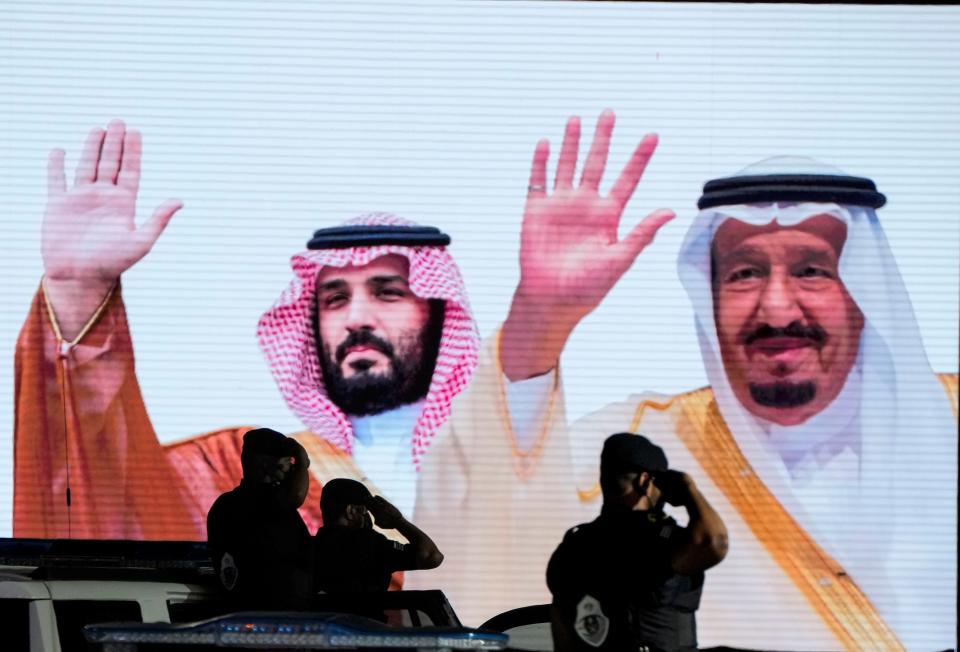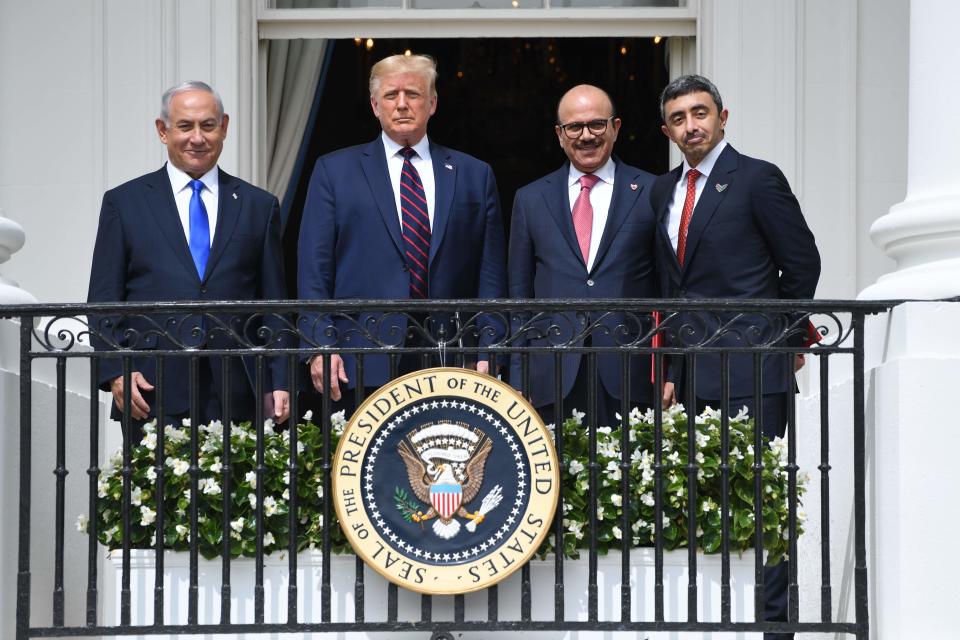President Biden wants to build ties between Israel and Saudi Arabia. Why it matters to the US
President Joe Biden’s trip to Israel and Saudi Arabia this week is as much about building ties between those two nations as it is about managing America’s relationship with the countries.
Israel and Saudi Arabia are increasingly aligned in their opposition to Iran – an arch-rival and growing nuclear threat – among other hot-button global issues.
Although the establishment of formal diplomatic ties is not likely, the trip could lay the groundwork for what would be a historic rapprochement.
The latest
Biden's visit: A purpose of Biden’s trip, his first to the Middle East as president, is to deepen Israel’s integration in the region.
The backstory: During the Trump administration, Israel formalized diplomatic relations with the United Arab Emirates, Bahrain, Morocco and Sudan in the so-called Abraham Accords.
The significance: The big prize for Israel would be improving relations with Saudi Arabia, the birthplace of Islam and the custodian of its two holiest sites.
The controversy: Biden, who vowed as a presidential candidate to make Saudi Arabia a “pariah” state because of its human rights abuses, explained his trip by saying Israeli leaders wanted him to go.

What's about to happen
Biden is flying directly from Israel to Saudi Arabia, which Israeli Prime Minister Yair Lapid said signifies a “linkage between the visit and the ability to improve relations.” Steps that could be taken in that direction include facilitating the transfer of two strategic Red Sea islands from Egyptian sovereignty to Saudi control, an unresolved issue leftover from the 1979 Israeli-Egyptian peace treaty.
Saudi Arabia may allow Israeli airlines to use its airspace on routes to the Far East and back and allow direct flights from Israel to Saudi Arabia for Muslims making a pilgrimage to the holy cities of Mecca and Medina. The Biden administration encourages "deepening cooperation" and integration on air defenses to deal with Iran's growing ballistic missile capabilities, according to White House spokesman John Kirby.
Any normalization between Saudi Arabia and Israel would be a "long process," said Jake Sullivan, Biden's national security adviser
"But looking for progress and momentum in that direction is certainly something that we're focused on as we head off to the Middle East," Sullivan said Monday.
Top takeaways
A warming of relations between Israel and Saudi Arabia would be a foreign policy win for Biden, but it could undercut the push for a two-state solution – the creation of an independent Palestinian nation alongside Israel – which has been the North Star of a negotiated settlement to the decades-old conflict between Israel and the Palestinians. Before the Abraham Accords, Arab nations withheld normalization as leverage to push for a Palestinian state and improve Israel's treatment of the Palestinians.
Though the Trump administration considered the accords a substitute for progress on an Israeli-Palestinian peace agreement, the Biden administration hopes to leverage normalization as a bridge toward progress on the issue, according to Nimrod Novik, a former foreign policy adviser to Israeli Prime Minister Shimon Peres and now a fellow with the Israel Policy Forum, an organization that supports a two-state solution to the Israeli-Palestinian conflict.

What they are saying
Biden said he’s going to the Middle East in part to “deepen Israel's integration in the region, which I think we're going to be able to do and which is good – good for peace and good for Israeli security.”
Jon Alterman, director of the Middle East Program at the Center for Strategic and International Studies, expects to see “modest and largely procedural advances” in public. There is “clearly an interesting private discussion” around security issues, he said, “but I don't think we're going to see any evidence of that in this meeting.”
The Israelis and the Saudis have an alignment of interests on multiple fronts, said Osamah Khalil, a Syracuse University history professor who specializes in Middle East affairs. Though the Palestinian issues remain a stumbling block, Khalil said it’s “only a matter of time” before the Saudis make their own arrangement with Israel as other Arab nations have.
Normalized relations between Israel and Saudi Arabia “would effectively end anything called an Arab-Israeli conflict,” said Khaled Elgindy, director of a program on Palestinian-Israeli affairs at the Middle East Institute. “It would probably also mean the end of a two-state solution, if it’s not already dead.”
David Rundell, a former American diplomat who served in Saudi Arabia, called the kingdom a “status quo power that seeks stability in the region.” “They would like the Arab-Israeli dispute resolved, and they have consistently supported American efforts to do that for 40 years,” he said. “The will is there.”

Why it matters
The United States would benefit from a more stable Middle East, particularly when so much is going on in the rest of the world. Biden had hoped to focus on the economic and military threat posed by China, which is becoming increasingly aggressive in the South China Sea. That foreign policy priority was challenging enough even before Russia invaded Ukraine.
“As an American, we’re used to the Middle East being the source of instability, threats,” said Richard Fontaine, CEO of the Center for a New American Security. “And if you look around the world, on the diplomatic front, right now the Middle East is one of the very few areas where there actually are some potential opportunities.”
The last major peace accords Israel signed with its Arab neighbors were with Egypt in 1978, then 16 years later with Jordan.
Since then, ties between Israel and those two countries have been dominated by a "cold peace" – mixed cooperation on economic and security issues along with mutual distrust, particularly over the Palestinian issue.
For Israel, establishing official diplomatic ties with Saudi Arabia is viewed as "a foundational point of a larger reconciliation within the region, and more globally, beyond with the larger Muslim community around the world,” Barbara Leaf, assistant secretary of state for near eastern affairs, told Congress
Want to know more? Here's what you missed
'Pariah' state: Why it may take more than golf to restore Saudi Arabia's reputation
More: Biden to meet with Saudi crown prince during trip to the kingdom despite human rights concerns
Political upheaval: Israel heads for unprecedented fifth election in three years after government collapses
This article originally appeared on USA TODAY: Can Biden help Israel and Saudi Arabia establish diplomatic ties?

